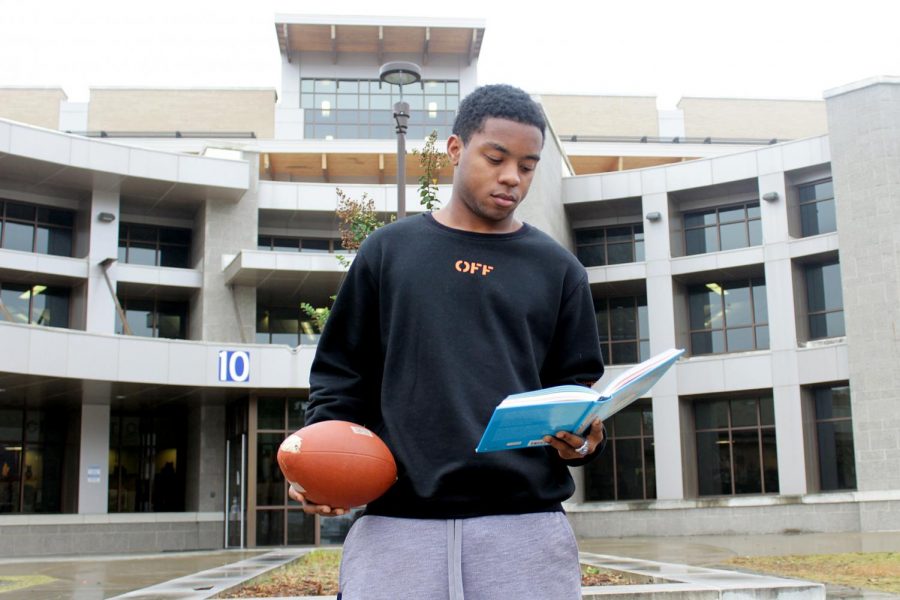“Quitters:” a Look Into Former Student Athletes
November 13, 2017
“Winners never quit and quitters never win.”
This old adage from legendary football coach Vince Lombardi sums up the view the sports world has of quitters. The stigma of being a quitter exists at all levels, and as sports fans, we have a stereotype for quitters: weak-minded, not motivated, poorly conditioned losers.
This stereotype is flat-out wrong.
There are several athletes who were at the top of their class, lost the love for the game and then quit. There is nothing wrong with that. They were winners who over time lost their passion, opened their eyes and realized there was a life outside of sports.
Senior Diante Woodson was once a star football player. He rushed for hundreds of yards in middle school as the school’s lead running back. He continued to play in freshman year and remained a top-shelf prospect. In ninth grade, Woodson rushed for five touchdowns and 648 yards. His jukes, elusiveness and next-level ball carrier vision made him a star.
“From the first time I came onto the field, I received praise from the coaches,” Woodson said. “I don’t want to sound cocky, but I felt like I was a game-changer, like I really made a difference.”
Woodson did not just play football. He also was a show-stopping small forward on the middle school basketball team. His athleticism was unparalleled.
“I loved playing with the team,” Woodson said. “We weren’t ever great, but it was so fun to just go out there and play.”
However, despite his ability,Woodson never seemed happy with any of it. He quit basketball three games into his eighth grade season. He left football before the start of his sophomore season. By definition, Woodson is a quitter.
“I never really loved football,” Woodson said. “My dad wanted me to play football, so I did. I never developed a passion for the game. So after freshman year, I told the coaches that I didn’t want to play anymore. They were pretty shocked, and they started to tell me I had a chance to play varsity my sophomore year. That didn’t matter to me. That stuff only matters to people who love the game. I didn’t.”
Woodson’s friend group is much different than it once was. When Woodson played multiple sports, his best friends were his teammates. The longer he stayed away from football and basketball, the more he began to cut ties with them. It was nothing personal–it was just the nature of what quitting sports really does. It’s a decision with rippling effects that can change every facet of a player’s life, positively and negatively.
“Once I quit football, that’s when I started to realize [more about] the world around me,” Woodson said. “Success in the classroom wasn’t even on my radar. When I was in sports, the only thing I focused on was going undefeated or breaking a record or trying to win state. Now that I’ve walked away, I’ve been able to take a step back and understand my world.”
Since quitting football and basketball, Woodson has taken up an interest in politics.
“When I quit football, my life changed,” Woodson said. “I started to pay attention to politics and the economy, the stuff that was going to matter to me after high school. I don’t think that would have happened if I’d stayed in football.”
Senior Tristan Calhoun was another middle school sensation. Calhoun started at quarterback and point guard in ninth grade. He was an unstoppable force. In football, Calhoun was a dual-threat quarterback. He could throw a bomb downfield one play and the very next play burn opponents on a read option. He had it all.
“I would just lob the ball up downfield and watch my [receivers] go get it,” Calhoun said. “They were crazy fast. It made everything so much easier. I wasn’t afraid to run either. I’d take off if I didn’t see anyone open. I didn’t care.”
Basketball was Calhoun’s favorite of the two. He had an offensive arsenal like no other eighth grader, leading his team in scoring. He had a very consistent three-point shot and a great feel for drawing fouls when driving to the lane.
“I was a scorer,” Calhoun said. “I was the leading scorer on all my teams, and we were pretty good in middle school. I averaged like 16 points a game in eighth grade. Growing up, I thought I was going to be a pro-basketball player. I wanted to be in the NBA.”
It all ended after freshman year. Calhoun was moved from quarterback to cornerback in football. His ninth grade team only managed to win three games. Calhoun’s competitive spirit had worn out; his passion had left him. He attempted to fight through it, but before his sophomore season began, he quit.
“The practices are what killed me,” Calhoun said. “We’d practice for hours, and I wouldn’t have a chance to do anything but sleep. It was killing my grades, and one day I just decided that playing sports wasn’t worth it.”
Calhoun will admit he wasn’t interested in school when he was an athlete. It wasn’t until after he left the sports world that he realized his true potential.
“My grades have never been higher,” Calhoun said. “My ACT score is higher than I ever thought it could be. I don’t think any of this would have happened without me quitting sports.”
These are just a couple of the hundreds of stories of phenoms losing their passion for sports and finding themselves in other meaningful ways. Whether it is in sports or in life, no one should feel pressured to do something they aren’t passionate about.
“I’m thankful that I got out,” Calhoun said. “If I didn’t quit when I did, I don’t know where I’d be now.”






